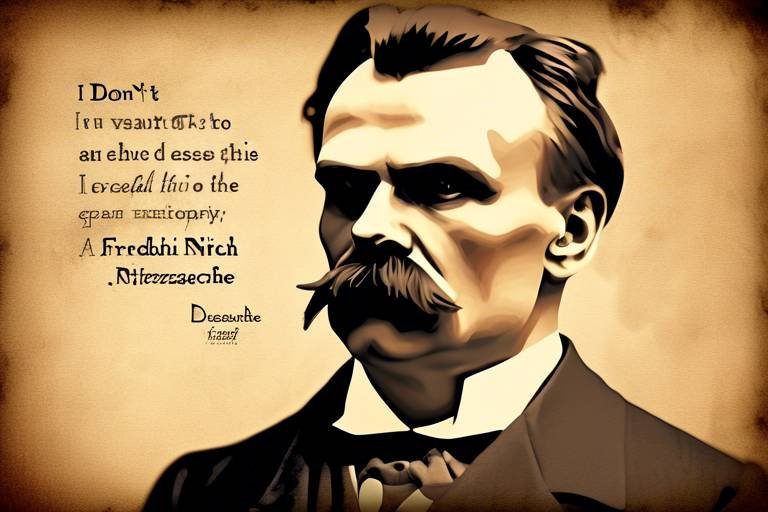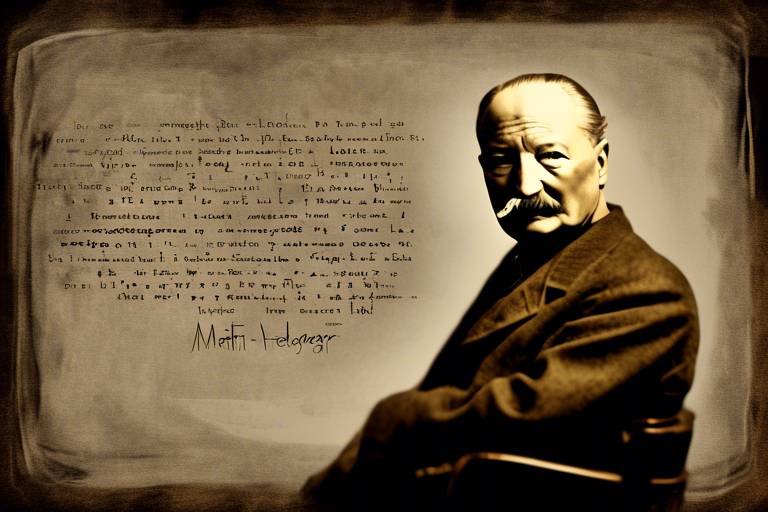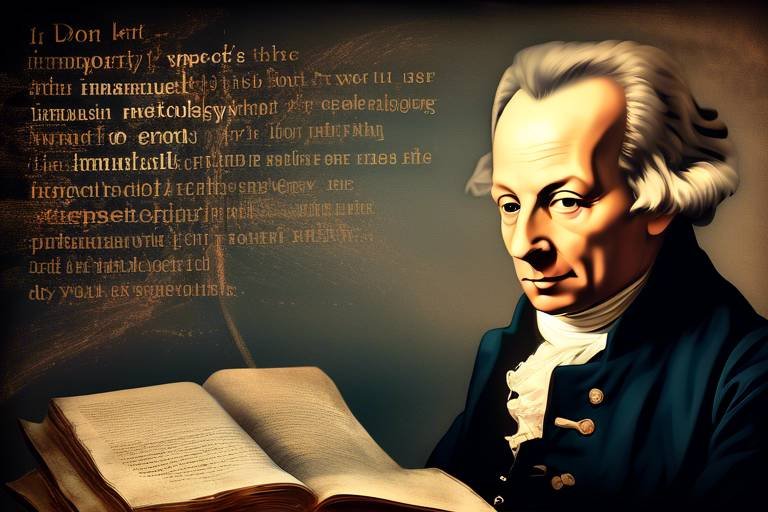Decoding the Philosophy of Friedrich Nietzsche
Friedrich Nietzsche, a name that resonates with the echoes of existential thought, invites us to challenge the very foundations of our beliefs. His philosophy is not merely a collection of ideas; it’s a profound exploration of morality, religion, and culture that pushes us to rethink our existence and purpose. Nietzsche's work is a kaleidoscope of thoughts that dares us to confront our inner selves and the world around us. From his critiques of traditional values to his visionary concepts like the Übermensch and the Will to Power, Nietzsche’s insights have left an indelible mark on modern thought.
As we delve into Nietzsche's philosophy, we encounter a landscape filled with contradictions and challenges. His ideas compel us to question the status quo and embrace a life filled with authenticity and creativity. In a world that often feels chaotic and devoid of meaning, Nietzsche’s philosophy serves as a beacon, guiding us through the murky waters of nihilism and existential dread. So, what exactly does Nietzsche propose, and how does it resonate in our contemporary lives? Let’s embark on this intellectual journey together!
Nietzsche’s idea of the Übermensch, or "Overman," is a cornerstone of his philosophy. This concept represents an ideal individual who transcends conventional morality, embodying creativity and strength. But what does it mean to be an Übermensch? It’s not about being superior in a traditional sense; rather, it’s about embracing one’s individuality and crafting one’s own values. The Übermensch is a figure who rises above societal norms, challenging the limitations imposed by culture and tradition.
In practical terms, the implications of striving to become an Übermensch can be profound. It encourages personal development through self-overcoming and the rejection of imposed beliefs. Imagine a world where individuals actively shape their destinies, free from the shackles of societal expectations. This vision can inspire us to pursue our passions, challenge our fears, and ultimately, live a life that is true to ourselves.
At the heart of Nietzsche's philosophy lies the Will to Power, a concept that encapsulates the driving force behind human behavior. It’s not merely about domination; rather, it represents a fundamental striving for growth, achievement, and self-assertion. Nietzsche believed that this will is the essence of life itself, propelling us toward our goals and aspirations.
Think about it: every time you push through a challenge, every moment you strive to better yourself or your circumstances, you are exercising your Will to Power. It’s a dynamic force that influences personal ambition and shapes the dynamics of our relationships and society. In this light, our interactions become a dance of power, where each individual seeks to assert themselves while navigating the complexities of human connection.
Nietzsche’s perspective on power dynamics reveals how relationships can be shaped by the struggle for dominance. In every relationship, whether personal or professional, there exists a subtle interplay of power. This struggle can manifest in various ways, from the overtly competitive to the more nuanced forms of influence and persuasion. Understanding these dynamics can help us navigate our interactions more effectively.
The distinction between master and slave morality is crucial in Nietzsche's thought. Master morality values strength, power, and nobility, while slave morality arises from the oppressed, emphasizing humility, empathy, and meekness. This dichotomy influences not only personal behavior but also societal structures. By recognizing these moral frameworks, we can better understand the motivations behind our actions and the actions of others.
Nietzsche emphasizes the importance of overcoming resentment to embrace life fully. Resentment can be a heavy burden, weighing us down and hindering our growth. By letting go of victimhood and focusing on personal empowerment, we can transform our lives. Strategies for personal growth include practicing gratitude, seeking self-awareness, and fostering a mindset of resilience.
Nietzsche champions creativity and individualism as essential components of a fulfilled life. In a society that often promotes conformity, his call to embrace our unique identities is more relevant than ever. By challenging societal norms, we can foster personal authenticity and cultivate a life that reflects our true selves.
Nihilism, a significant theme in Nietzsche's work, questions the inherent meaning of life. It can feel daunting to confront the idea that life may lack intrinsic value, but Nietzsche doesn’t leave us in despair. Instead, he invites us to create our own meaning in an indifferent universe. This perspective opens the door to a more profound exploration of ethics, existence, and purpose.
In response to nihilism, Nietzsche calls for a revaluation of values. This revaluation is not merely a rejection of existing morals but an opportunity to forge new ethical frameworks and personal philosophies. By questioning deeply held beliefs, we can discover new paths and redefine what is valuable in our lives.
Nietzsche's ideas have profoundly influenced various fields, including psychology, literature, and existentialism. His challenge to established norms and his exploration of the human condition continue to resonate in contemporary discourse. Thinkers like Sigmund Freud and Jean-Paul Sartre drew inspiration from Nietzsche, weaving his concepts into their own theories and philosophies.
In conclusion, Friedrich Nietzsche's philosophy is not just an academic pursuit; it’s a call to action. It urges us to question, to create, and to live authentically. As we navigate the complexities of modern life, Nietzsche’s insights can guide us toward a more profound understanding of ourselves and the world around us.
- What is the Übermensch? The Übermensch is an ideal individual who transcends conventional morality, embodying creativity and strength.
- What does the Will to Power mean? It refers to the fundamental driving force behind human behavior, emphasizing growth and self-assertion.
- How does Nietzsche define master and slave morality? Master morality values strength and power, while slave morality values humility and empathy.
- What is nihilism according to Nietzsche? Nihilism questions the inherent meaning of life, suggesting that we must create our own meaning in an indifferent universe.

The Concept of the Übermensch
Friedrich Nietzsche’s concept of the Übermensch, often translated as "Overman" or "Superman," is one of the cornerstones of his philosophy. Imagine a figure who rises above the conventional values and moral constraints imposed by society; this is the essence of the Übermensch. Nietzsche envisioned this ideal individual as someone who embraces their own creativity and strength, forging their own path in life. But what does it truly mean to embody the Übermensch? It’s about transcending the limitations that society places upon us and realizing our full potential.
At its core, the idea of the Übermensch challenges us to reflect on our personal values and beliefs. Nietzsche believed that many people live their lives in accordance with societal norms, often suppressing their true desires and ambitions. The Übermensch, in contrast, is a beacon of individualism and authenticity. They are not bound by traditional morality; instead, they create their own values and live by them. This can be a liberating yet daunting prospect, as it requires a deep introspection and a willingness to confront the uncomfortable truths about oneself.
To further understand the implications of the Übermensch, let’s consider some of its key characteristics:
- Self-Mastery: The Übermensch exercises control over their instincts and desires, channeling them into creative and productive outlets.
- Creativity: They are not just consumers of culture; they are creators, contributing original ideas and art to the world.
- Strength of Will: The Übermensch possesses a robust willpower, enabling them to overcome obstacles and challenges.
- Affirmation of Life: They embrace life in all its complexity, including its suffering and chaos, rather than seeking escape in nihilism or resignation.
Nietzsche’s Übermensch is not merely a philosophical abstraction; it serves as a call to action for individuals to strive for greatness. It invites us to ask ourselves: Are we living authentically? Are we creating our own values, or are we merely adhering to those handed down through generations? This self-examination can lead to profound personal development and societal evolution.
Furthermore, the concept of the Übermensch has significant implications for culture and society. Nietzsche argued that societies often stifle creativity and individuality in favor of conformity. By embracing the ideals of the Übermensch, we can cultivate a culture that celebrates diversity and encourages innovation. This shift could lead to a more vibrant and dynamic society, one where individuals are empowered to express their true selves.
In conclusion, the Übermensch represents an ideal to aspire to, a figure who defies the ordinary and embraces the extraordinary. Nietzsche’s vision challenges us to break free from societal constraints and to live authentically, fostering a culture that values creativity and individuality. As we navigate the complexities of modern life, the question remains: Are we ready to become our own Übermensch?

The Will to Power
Friedrich Nietzsche’s concept of the Will to Power is nothing short of a revolutionary idea that challenges the very foundation of human motivation. It posits that the primary driving force behind human behavior is not merely survival or reproduction but rather a fundamental desire to assert and enhance one's power and influence. Imagine life as a grand stage where each individual is both an actor and a director, constantly striving to shape their reality and assert their presence in the world. This concept invites us to reflect on our ambitions and the underlying motivations that propel us forward.
At its core, the Will to Power encompasses a range of human experiences, from personal ambition to the dynamics of social relationships. Nietzsche believed that this drive manifests in various forms, such as creativity, ambition, and the pursuit of excellence. It's about more than just achieving goals; it's about the relentless quest for growth and self-overcoming. Picture a sculptor chiseling away at a block of marble, each strike representing the struggle to reveal the masterpiece within. This analogy encapsulates the essence of the Will to Power—it's not just about the final product but the transformative journey that leads to personal evolution.
In the realm of relationships, the Will to Power takes on a fascinating dimension. Nietzsche's perspective suggests that interactions between individuals are often influenced by a struggle for dominance. This can lead to complex power dynamics where individuals either assert their influence or find themselves in subordinate positions. Understanding these dynamics can be crucial for navigating personal and social interactions. Consider the following aspects:
- Assertiveness: Individuals who embody the Will to Power often display a strong sense of assertiveness, influencing those around them.
- Manipulation: Conversely, some may resort to manipulation to gain power, highlighting the darker side of this drive.
- Collaboration: In some cases, the Will to Power can lead to collaboration, where individuals unite their strengths for mutual benefit.
Nietzsche also contrasts master morality with slave morality, providing insight into how the Will to Power operates within societal structures. Master morality, characterized by strength and creativity, celebrates life and embraces the pursuit of power. In contrast, slave morality arises from the resentment of those who feel powerless, promoting values such as humility and meekness. This dichotomy illustrates how the Will to Power can shape not only individual behavior but also societal norms and values.
Moreover, Nietzsche emphasizes the significance of overcoming resentment as a vital step in fully embracing the Will to Power. Resentment can act as a chain, binding individuals to a victim mentality that stifles growth and creativity. In order to harness the true potential of the Will to Power, one must learn to let go of grievances and embrace life with all its challenges. This process of personal growth involves recognizing the power within oneself and using it to forge a path toward authenticity and fulfillment.
In summary, the Will to Power is a multifaceted concept that urges individuals to reflect on their motivations, ambitions, and relationships. It challenges us to embrace our inherent drive for power and influence while navigating the complexities of social dynamics. By understanding and harnessing this drive, we can cultivate a more profound sense of purpose and direction in our lives, ultimately leading to personal evolution and societal transformation.
- What is the Will to Power? The Will to Power is a fundamental concept in Nietzsche's philosophy, suggesting that the primary driving force behind human behavior is the desire to assert and enhance one's power and influence.
- How does the Will to Power influence relationships? The Will to Power shapes relationships through dynamics of dominance and submission, affecting how individuals interact and collaborate.
- What is the difference between master and slave morality? Master morality values strength and creativity, while slave morality arises from resentment and promotes values like humility and meekness.
- How can one overcome resentment? Overcoming resentment involves recognizing personal power, letting go of grievances, and embracing life's challenges as opportunities for growth.

Power Dynamics in Relationships
When we think about relationships, whether they're romantic, familial, or platonic, it’s easy to overlook the subtle yet powerful dynamics of power that often govern them. Nietzsche, with his keen insight, sheds light on how these dynamics can shape our interactions and influence our emotional landscapes. Imagine a dance where each partner is trying to lead; the rhythm of the relationship can shift dramatically based on who takes the lead. This concept of power is not merely about dominance but involves a complex interplay of desires, fears, and aspirations.
At the heart of Nietzsche’s philosophy lies the idea that power is a fundamental human drive. In relationships, this drive can manifest in various ways. For instance, one partner may seek to influence decisions, while another may assert their independence. This struggle for power can lead to a rich tapestry of emotional exchanges, but it can also result in conflict if not navigated with care. Think of it like a game of chess—each move is calculated, each piece represents a different aspect of the relationship, and the outcome depends on how well each player understands their own position and that of their opponent.
Understanding these dynamics can be crucial for fostering healthier relationships. Here are a few aspects to consider:
- Communication: Open dialogue can help clarify intentions and reduce misunderstandings.
- Empathy: Recognizing the other person's perspective can create a more balanced power dynamic.
- Boundaries: Establishing clear boundaries can prevent one partner from overpowering the other.
Moreover, Nietzsche's concept of the master-slave morality is particularly relevant here. In relationships, we can see this dichotomy play out when one person assumes a dominant role while the other takes on a more submissive position. This dynamic can lead to resentment and dissatisfaction if the balance of power is not addressed. It’s essential to recognize that both roles can be fluid, and understanding when to shift can lead to a more equitable partnership.
Ultimately, the power dynamics in relationships are not just about who holds the reins; they’re about creating a space where both individuals can thrive. By acknowledging these dynamics and striving for a balance, we can cultivate relationships that are not only fulfilling but also enriching. Just as Nietzsche challenged us to look beyond traditional values, we too must challenge ourselves to redefine how we perceive power in our connections with others.
- What is the significance of power dynamics in relationships?
Power dynamics play a crucial role in shaping interactions, influencing decision-making, and determining the overall health of a relationship. - How can I identify power struggles in my relationship?
Look for patterns where one partner consistently dominates conversations or decisions, leading to feelings of resentment or frustration in the other. - What can I do to create a more balanced power dynamic?
Focus on open communication, establish boundaries, and practice empathy to ensure both partners feel valued and heard.

Master-Slave Morality
Nietzsche's concept of is a fascinating exploration of how values and ethics are shaped by power dynamics in society. At its core, this distinction highlights two opposing moral frameworks: the master morality and the slave morality. Master morality originates from those in positions of power and privilege, who define their values based on strength, nobility, and the affirmation of life. In contrast, slave morality emerges from the oppressed, who create their values in reaction to their circumstances, often emphasizing traits like humility, empathy, and meekness.
This dichotomy is not just an academic exercise; it has profound implications for how individuals and societies operate. For instance, those who subscribe to master morality may view life as a canvas for ambition and creativity, while those influenced by slave morality might prioritize community and altruism. Nietzsche argues that this creates a tension that shapes cultural narratives and societal structures. To illustrate this further, consider the following table that outlines the key differences between the two moralities:
| Aspect | Master Morality | Slave Morality |
|---|---|---|
| Source of Values | Self-affirmation and strength | Reaction to oppression |
| View of Life | Life as a challenge to be embraced | Life as suffering to be endured |
| Key Traits | Power, pride, creativity | Humility, compassion, meekness |
Nietzsche believed that the prevalence of slave morality in modern society leads to a culture that often glorifies victimhood and mediocrity. This creates a paradox where individuals may feel empowered by their victim status, yet simultaneously remain shackled by it. He challenges us to recognize these dynamics and consider how they affect our personal and collective identities. Are we, as a society, allowing ourselves to be defined by our limitations rather than our strengths?
Furthermore, Nietzsche's critique extends beyond mere observation; he urges individuals to transcend these moral frameworks. By embracing a more nuanced understanding of morality, we can begin to forge our own paths and redefine what it means to live authentically. This involves a conscious effort to reject the dichotomy of master and slave morality, allowing for a more integrated approach that values both strength and compassion.
In essence, the exploration of master-slave morality is not just a philosophical debate; it is a call to action. It invites us to reflect on our own values and the societal influences that shape them. Are we merely products of our environments, or can we rise above them to create a more meaningful existence? By engaging with these questions, we can begin to understand the complexities of morality in a way that fosters personal growth and societal evolution.
- What is master-slave morality? Master-slave morality is a philosophical concept introduced by Nietzsche that distinguishes between two types of moral frameworks: one that values strength and power (master morality) and another that arises from oppression and values humility and empathy (slave morality).
- How does master-slave morality affect society? The prevalence of slave morality can lead to cultural narratives that prioritize victimhood and mediocrity, potentially stifling individual ambition and creativity.
- Can we transcend these moral frameworks? Yes, Nietzsche encourages individuals to rise above the limitations of master and slave morality to create a more integrated and authentic approach to life.

Overcoming Resentment
Resentment can feel like a heavy backpack filled with rocks, dragging you down as you navigate through life. It’s that nagging voice in your head that keeps reminding you of past grievances, making it hard to enjoy the present. Nietzsche believed that is crucial for embracing life in all its chaotic beauty. But how do we shake off the weight of those rocks and lighten our emotional load?
First and foremost, it’s essential to recognize that resentment often stems from a sense of powerlessness. When we feel wronged, our instinct is to cling to our grievances as a way to reclaim control. However, Nietzsche encourages us to flip the script. By acknowledging our feelings without letting them define us, we can begin to transform our perspective. This shift is not just about letting go; it’s about taking ownership of our emotions and using them as fuel for personal growth.
One effective strategy for overcoming resentment is to practice forgiveness. Now, I know what you might be thinking: “Forgiveness? That’s easier said than done!” But consider this: forgiveness is less about the other person and more about freeing yourself from the shackles of negativity. When you forgive, you’re essentially saying, “I refuse to let this experience control my happiness.” It’s a powerful act of self-liberation.
Another approach is to engage in self-reflection. Take a moment to ask yourself some tough questions: What does this resentment say about my values? How have I contributed to this situation? By diving deep into your feelings, you can uncover underlying issues that may need your attention. This process not only helps you understand your emotions better but also paves the way for healing.
Additionally, Nietzsche emphasizes the importance of embracing life’s challenges as opportunities for growth. Instead of viewing resentment as a stumbling block, see it as a stepping stone. Each time you face a grievance, you have a chance to strengthen your character and build resilience. It’s like lifting weights at the gym; the more you push through the discomfort, the stronger you become.
To illustrate how overcoming resentment can transform your life, consider the following table that outlines the benefits of letting go:
| Benefit | Description |
|---|---|
| Improved Mental Health | Letting go of resentment can reduce anxiety and depression, leading to a more positive outlook on life. |
| Stronger Relationships | Forgiveness fosters healthier connections with others, allowing for deeper and more meaningful interactions. |
| Enhanced Personal Growth | Overcoming resentment opens the door to self-discovery and personal development. |
| Increased Resilience | Facing and overcoming grievances builds emotional strength, preparing you for future challenges. |
In conclusion, overcoming resentment is not just an act of kindness towards others; it’s a radical act of self-love. By embracing forgiveness, engaging in self-reflection, and viewing challenges as opportunities, you can free yourself from the burden of bitterness. Nietzsche’s philosophy encourages us to rise above our grievances and live fully in the moment, creating a life that’s rich in authenticity and joy.
- What is the first step to overcoming resentment?
Recognizing and acknowledging your feelings is the first step towards overcoming resentment. - Can forgiveness really help in letting go of resentment?
Yes, forgiveness is a powerful tool that can help free you from the emotional burden of resentment. - How does self-reflection aid in overcoming resentment?
Self-reflection allows you to understand the root causes of your feelings and can lead to personal growth. - Is it possible to fully overcome resentment?
While it may take time and effort, many people find that they can significantly reduce feelings of resentment through various strategies.

Creativity and Individualism
Friedrich Nietzsche believed that creativity and individualism are not just traits; they are essential elements of a fulfilled life. In a world that often pressures individuals to conform, Nietzsche's philosophy encourages us to break free from the shackles of societal expectations and embrace our unique identities. Imagine standing at the edge of a vast ocean, where each wave represents a different idea or perspective. To truly live, one must dive into these waves, exploring the depths of creativity that lie beneath the surface.
At the heart of Nietzsche's advocacy for creativity is the notion that individual expression is paramount. He argued that every person has the potential to become an artist of their own life, crafting a narrative that reflects their values, passions, and aspirations. This artistic approach to living is not merely about creating art in the traditional sense but about shaping one’s existence with intention and authenticity. In this light, individualism becomes a canvas upon which we paint our experiences, beliefs, and dreams.
Nietzsche's call for creativity is also a challenge to the status quo. He believed that societal norms often stifle innovation and self-expression. Think of a garden where all the flowers are the same color; it may be beautiful, but it lacks diversity. Nietzsche encourages us to plant a garden of varied colors and forms, each representing a different facet of our individuality. This diversity not only enriches our own lives but also contributes to a more vibrant and dynamic society.
Moreover, Nietzsche's emphasis on individualism suggests that true strength lies in embracing one’s uniqueness. He posited that individuals should not shy away from their differences but instead celebrate them. In a world that often promotes uniformity, standing out can feel daunting. However, Nietzsche reminds us that the most profound changes in society often come from those bold enough to challenge norms and express their true selves. This is where the concept of the Übermensch comes into play—a figure who embodies creativity and individualism, transcending conventional boundaries to forge a new path.
In practical terms, fostering creativity and individualism can manifest in various ways. Here are some strategies to cultivate these qualities in your life:
- Engage in creative hobbies that excite you, whether it's painting, writing, or music.
- Surround yourself with diverse perspectives and ideas to inspire your own thinking.
- Challenge societal norms by questioning what is considered "normal" or "acceptable."
- Reflect on your values and beliefs regularly to ensure they align with your true self.
Ultimately, Nietzsche's philosophy of creativity and individualism serves as a powerful reminder that life is a personal journey, and each of us has the potential to carve out our unique path. By embracing our individuality and championing our creative instincts, we not only enrich our own lives but also contribute to the tapestry of human experience. So, the next time you feel the urge to conform, remember Nietzsche's call to be bold, be creative, and most importantly, be yourself.
What does Nietzsche mean by individualism?
Nietzsche's concept of individualism emphasizes the importance of personal expression and authenticity, encouraging people to break free from societal norms and embrace their unique identities.
How can I cultivate creativity in my life?
You can cultivate creativity by engaging in hobbies, seeking diverse perspectives, challenging societal norms, and regularly reflecting on your personal values and beliefs.
Why is creativity important in Nietzsche's philosophy?
Creativity is essential in Nietzsche's philosophy because it allows individuals to express their true selves, challenge the status quo, and contribute to a more vibrant society.

Nihilism and Its Implications
Nihilism is a concept that can send shivers down the spine of anyone who dares to ponder its depths. At its core, nihilism suggests that life lacks inherent meaning, purpose, or value. Friedrich Nietzsche, one of the most influential philosophers to tackle this theme, didn’t just throw nihilism into the ring; he wrestled with it, dissected it, and ultimately sought to redefine it. Imagine standing in the middle of a vast desert, devoid of landmarks or signs—this is the existential landscape that nihilism paints. It raises profound questions: If life has no meaning, what are we to do? How do we navigate a world that seems indifferent to our existence?
Nietzsche argued that the advent of nihilism was a consequence of the decline of traditional religious and moral values. As society moved away from these anchors, many people found themselves adrift, grappling with the realization that the old certainties no longer held. This realization can be both liberating and terrifying. On one hand, it frees individuals from the shackles of dogma; on the other, it can lead to despair and a sense of purposelessness. Nietzsche believed that rather than succumbing to nihilism, we should confront it head-on. He famously proclaimed, “He who has a why to live can bear almost any how.” In other words, finding personal meaning in an indifferent universe is not only possible but essential.
To navigate this nihilistic terrain, Nietzsche proposed a radical solution: the revaluation of values. This concept involves critically assessing and redefining our values and beliefs in light of nihilism. Instead of adhering to pre-existing moral frameworks, individuals are encouraged to create their own values, thus reclaiming their agency in a seemingly chaotic world. This process can be likened to a sculptor chiseling away at a block of marble, revealing a unique masterpiece that reflects personal truth.
Moreover, the implications of nihilism extend beyond personal introspection. They ripple through our ethical frameworks and societal structures. When traditional values are called into question, it opens the door to a myriad of ethical perspectives. For instance, in a nihilistic framework, one might adopt a more subjective view of morality, where right and wrong are not absolute but rather shaped by individual experiences and cultural contexts. This could lead to a more pluralistic society, where diverse viewpoints are acknowledged and respected. However, it also poses challenges, as the absence of shared values can lead to conflicts and societal fragmentation.
In essence, Nietzsche's exploration of nihilism invites us to embrace the chaos of existence rather than flee from it. It challenges us to take responsibility for our lives and the meanings we ascribe to them. Instead of waiting for a cosmic sign to guide us, we are called to become the artists of our own lives, painting with bold strokes of creativity and authenticity. In this way, nihilism is not merely a void; it is a canvas of possibilities waiting to be filled.
- What is nihilism? Nihilism is the philosophical belief that life lacks inherent meaning, purpose, or value.
- How did Nietzsche view nihilism? Nietzsche saw nihilism as a consequence of the decline of traditional values and sought to confront it by advocating for the revaluation of values.
- What does revaluation of values mean? It refers to the process of critically assessing and redefining one’s values in light of nihilism, creating personal meaning in an indifferent universe.
- Can nihilism lead to despair? Yes, it can lead to feelings of purposelessness, but Nietzsche believed it could also be liberating if individuals create their own meanings.

The Revaluation of Values
Friedrich Nietzsche's concept of the revaluation of values is like a breath of fresh air in a stuffy room; it challenges the very foundations upon which our ethical beliefs are built. Imagine standing at the edge of a vast canyon, looking down into the depths of moral certainty, and realizing that what you thought was solid ground might actually be nothing more than an illusion. Nietzsche believed that traditional values, often rooted in religious and societal norms, had become outdated and needed a radical rethinking. This revaluation is not merely an academic exercise; it is a call to action for individuals to reassess their beliefs and the values that govern their lives.
At the heart of this revaluation lies the recognition that many values we hold dear are not universal truths but rather constructs shaped by historical and cultural contexts. Nietzsche argued that the dominant moral frameworks of his time, particularly those influenced by Christianity, promoted weakness and conformity rather than strength and individuality. He saw this as a form of nihilism, where the true essence of life is overshadowed by imposed moral codes that stifle creativity and personal growth.
To illustrate this, consider the following table that contrasts traditional values with Nietzsche's proposed revalued values:
| Traditional Values | Revalued Values |
|---|---|
| Conformity | Individualism |
| Self-denial | Self-affirmation |
| Weakness | Strength |
| Victimhood | Empowerment |
| Fear of life | Embrace of existence |
This shift in perspective encourages individuals to embrace their instincts and passions rather than suppress them. Nietzsche believed that by engaging in this revaluation, people could cultivate a new set of values that promote personal authenticity and a more profound engagement with life. It’s about breaking free from the shackles of societal expectations and discovering what truly resonates with one’s own being.
As we navigate through the complexities of modern life, the revaluation of values remains ever relevant. In a world filled with conflicting ideologies and moral dilemmas, Nietzsche's challenge to rethink our values can serve as a guiding light. It encourages us to ask, “What do I truly believe?” and “How do my values shape my actions?” By answering these questions, we can begin to forge a path that is uniquely our own, one that aligns with our innermost desires and aspirations.
In conclusion, Nietzsche's revaluation of values is not just a philosophical concept; it is a transformative process that invites us to question the status quo, embrace our individuality, and live authentically. It’s a reminder that the power to redefine our values lies within us, waiting to be unleashed.
- What does Nietzsche mean by "revaluation of values"?
Nietzsche's revaluation of values refers to the critical examination and reassessment of traditional moral values, advocating for a new set of values that promote individuality and strength. - Why is the revaluation of values important?
It encourages personal growth and authenticity by challenging outdated norms that may hinder individual potential and creativity. - How can I apply the revaluation of values in my life?
Start by questioning your beliefs and the origins of your values. Reflect on what resonates with you personally and seek to align your actions with those values.

Nietzsche’s Influence on Modern Thought
Friedrich Nietzsche, a name that often evokes a whirlwind of emotions and thoughts, has left an indelible mark on modern philosophy and various fields of study. His ideas have not only challenged traditional beliefs but have also paved the way for new ways of thinking. One might wonder, how did this controversial figure manage to influence so many areas, from psychology to literature? Let's dive into the profound effects of Nietzsche's philosophy on contemporary thought.
Nietzsche’s critique of established norms and his call for individualism resonate deeply in today’s society. His concept of the Übermensch encourages people to transcend societal limitations and create their own values. This idea has inspired countless individuals to embrace their uniqueness, fostering a culture that values personal authenticity over conformity. In a world where social media often promotes a homogenized image of success, Nietzsche's philosophy stands as a beacon for those seeking to carve their own paths.
Furthermore, Nietzsche's exploration of nihilism has sparked significant discussions about meaning and purpose in life. As traditional religious and moral frameworks have come under scrutiny, many have found themselves grappling with the void that nihilism presents. This existential crisis, while daunting, has also led to a renaissance of thought, prompting individuals to seek out new meanings and values in their lives. The question then arises: can we create meaning in an indifferent universe? Nietzsche's philosophy encourages us to embrace this challenge and forge our own destinies.
In the realm of psychology, Nietzsche's ideas have influenced thinkers like Sigmund Freud and Carl Jung. His insights into the human psyche, particularly the Will to Power, have provided a framework for understanding human motivation and behavior. This concept emphasizes that our actions are often driven by a desire to assert control and achieve mastery over our circumstances. The implications of this idea are vast, touching on everything from personal ambition to societal structures.
Moreover, Nietzsche's impact extends into literature, where his themes of existentialism and individualism have inspired writers and poets alike. Many modern authors draw upon Nietzschean concepts to explore the human condition, often portraying characters who grapple with the absurdity of existence and the quest for authenticity. His influence can be seen in the works of existentialists like Jean-Paul Sartre and Albert Camus, who echo Nietzsche's sentiments about the struggle for meaning in a chaotic world.
To illustrate Nietzsche's multifaceted influence, consider the following table that summarizes his impact across various disciplines:
| Field | Influence |
|---|---|
| Philosophy | Challenged traditional morality, promoted individualism. |
| Psychology | Inspired theories of motivation and the unconscious. |
| Literature | Influenced existentialist writers and themes of authenticity. |
| Art | Encouraged creative expression and the rejection of conventions. |
In conclusion, Nietzsche’s influence on modern thought is both profound and far-reaching. His ideas challenge us to rethink our values, confront the void of nihilism, and embrace our individual journeys. By encouraging creativity and personal authenticity, Nietzsche has inspired generations to question the status quo and seek their own truths. The next time you find yourself pondering the meaning of life or the nature of power, remember that Nietzsche’s philosophy offers not just answers, but a call to action.
- What is the Übermensch? The Übermensch is an idealized individual who transcends conventional morals, embodying creativity and strength.
- How did Nietzsche influence psychology? His concepts, particularly the Will to Power, have shaped theories about human motivation and behavior.
- What is nihilism according to Nietzsche? Nihilism questions the inherent meaning of life, prompting individuals to seek their own values and purpose.
- How is Nietzsche relevant today? His ideas encourage personal authenticity and challenge societal norms, making them relevant in contemporary discourse.
Frequently Asked Questions
- What is the concept of the Übermensch in Nietzsche's philosophy?
The Übermensch, or "Overman," is Nietzsche's vision of an ideal individual who rises above traditional morality. This figure embodies creativity, strength, and self-determination, challenging societal norms and inspiring personal growth. Essentially, the Übermensch represents the potential for humans to redefine values and create their own destinies.
- How does the Will to Power influence human behavior?
The Will to Power is a central idea in Nietzsche's philosophy, suggesting that the fundamental driving force behind human actions is a desire for power and dominance. This concept extends beyond mere political power; it encompasses ambition, creativity, and the pursuit of personal goals. Understanding this drive can help individuals navigate relationships and societal dynamics more effectively.
- What does Nietzsche mean by master-slave morality?
Nietzsche distinguishes between master morality, characterized by values such as strength, creativity, and nobility, and slave morality, which emphasizes humility, empathy, and weakness. This distinction highlights how different moral frameworks can shape societal structures and individual behaviors. Master morality celebrates life and power, while slave morality often arises as a reaction to oppression.
- How can one overcome resentment according to Nietzsche?
Nietzsche emphasizes the importance of overcoming resentment to fully embrace life. He suggests that individuals should focus on personal growth and self-empowerment rather than dwelling on past grievances. Strategies for overcoming resentment include cultivating self-awareness, practicing gratitude, and actively seeking to create meaning in one's life, thereby rejecting a victim mentality.
- What role does creativity play in Nietzsche's philosophy?
Creativity is a cornerstone of Nietzsche's thought, as he believes it is essential for personal authenticity and fulfillment. By championing individualism and self-expression, Nietzsche encourages people to challenge societal norms and pursue their unique paths. This creative spirit not only fosters personal growth but also contributes to the evolution of culture and society.
- What is nihilism, and how does it relate to Nietzsche's work?
Nihilism is a significant theme in Nietzsche's philosophy, questioning the inherent meaning of life and the existence of absolute truths. Nietzsche explores the implications of nihilism for ethics and existence, suggesting that it can lead to a crisis of values. However, he also advocates for a revaluation of values, encouraging individuals to create their own meaning in an indifferent universe.
- How has Nietzsche influenced modern thought?
Nietzsche's ideas have left a profound mark on various fields, including psychology, literature, and existentialism. His critiques of morality and religion, along with his exploration of individualism and creativity, continue to resonate in contemporary discourse. By challenging established norms and encouraging self-exploration, Nietzsche's legacy remains relevant in discussions about identity, purpose, and the human experience.



















